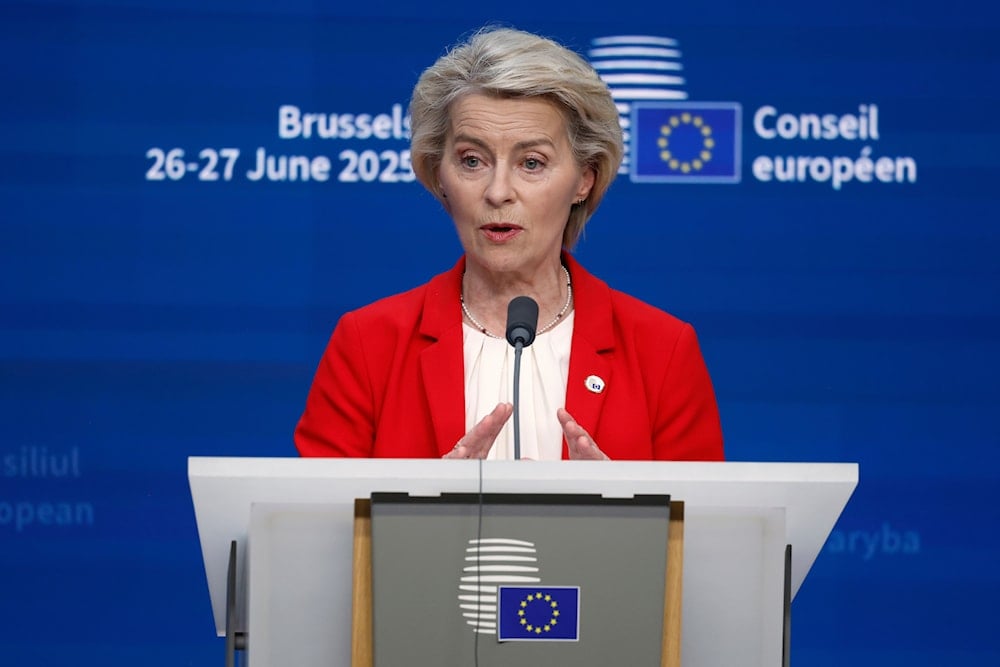EU ready for trade deal as Trump threatens new tariffs
EU signals readiness for trade deal with Trump amid looming tariffs and internal divisions.
-

European Commission President Ursula von der Leyen addresses a media conference at an EU summit in Brussels, on June 26, 2025. (AP Photo/Omar Havana)
European Commission President Ursula von der Leyen stated on Friday that the European Union is prepared to strike a trade deal with US President Donald Trump, though "all options remain on the table."
Speaking after briefing EU leaders at a summit in Brussels, von der Leyen said she was analyzing a new US negotiating document. "Our message today is clear, we are ready for a deal," she told reporters, adding, "At the same time, we are preparing for the possibility that no satisfactory agreement is reached… and we will defend the European interest as needed."
Trump has threatened to impose tariffs of up to 50% on all EU goods starting July 9 unless an agreement is reached. Currently, most EU exports face a 10% tariff, with levies on cars and car parts at 25%, and steel and aluminium at 50%.
Von der Leyen also floated the idea of initiating reforms to the World Trade Organization, noting growing concerns over the global trading system being undermined by trade wars and bilateral deals. She highlighted that the Asia Pacific CPTPP bloc, which includes the UK, has shown interest in collaborating with the EU on a rules-based foundation.
EU divided on trade approach: Germany vs. France
As the deadline approaches, internal divisions within the EU are emerging. German Chancellor Friedrich Merz advocated for a quick and simple trade agreement, under pressure from Germany's export-heavy industries, including carmakers, suggesting that an asymmetric deal might be better than no deal at all.
French President Emmanuel Macron, however, warned that accepting unequal terms would harm Europe's long-term competitiveness. One EU diplomat echoed this sentiment, warning that concessions to Trump might weaken the EU's position in future negotiations with countries like India or China.
Ireland's Prime Minister, Micheál Martin, emphasized the importance of a deal to provide certainty and protect jobs. Spain's Prime Minister, Pedro Sánchez, called Trump’s tariff threat "doubly unfair," highlighting that Spain runs a trade deficit with the US.
Von der Leyen noted that discussions with other trade blocs could represent a "beginning of redesigning" the WTO. The EU aims to show that free trade based on shared rules is still achievable.
The EU has temporarily suspended levies on €21 billion worth of US goods until mid-July to allow negotiations to continue. However, it is also consulting on further retaliatory tariffs on US exports valued at €95 billion, though the final total may be lower if approved. The bloc previously scrapped plans to target American bourbon after objections from France and Ireland, which feared countermeasures against cognac and whiskey.
Industry reactions and economic impact in Germany
Merz criticized the EU’s current approach as overly complex and urged focus on five key sectors, including automotive, steel, and pharmaceuticals. At a Berlin industry conference, Peter Leibinger, president of the German Federation of Industries (BDI), called on Merz to communicate the economic pain felt by German manufacturers to Brussels.
The BDI warned that the proposed US tariffs could shave 0.3% points off Germany’s economic growth, which is still recovering to pre-crisis levels.
EU Chief Trade Negotiator Maros Sefcovic said Europe’s car industry is "clearly bleeding," with carmakers facing a 25% tariff, in addition to an existing 2.5% levy. He stressed the need for unity in the EU approach and vowed to "fight tooth and nail" for European interests.
Sefcovic also suggested including a standstill clause in any agreement to prevent sudden spikes in tariffs and market volatility, noting, "It would be clearly desirable that we have some kind of clause to prevent surprises."
Belgium’s Prime Minister Bart De Wever emphasized that while negotiations must continue, appropriate countermeasures would be adopted if talks fail.
On that note, the EU now faces two options: either pursue a quick trade deal to ensure stability or prepare to retaliate against a wave of new US tariffs.

 4 Min Read
4 Min Read










